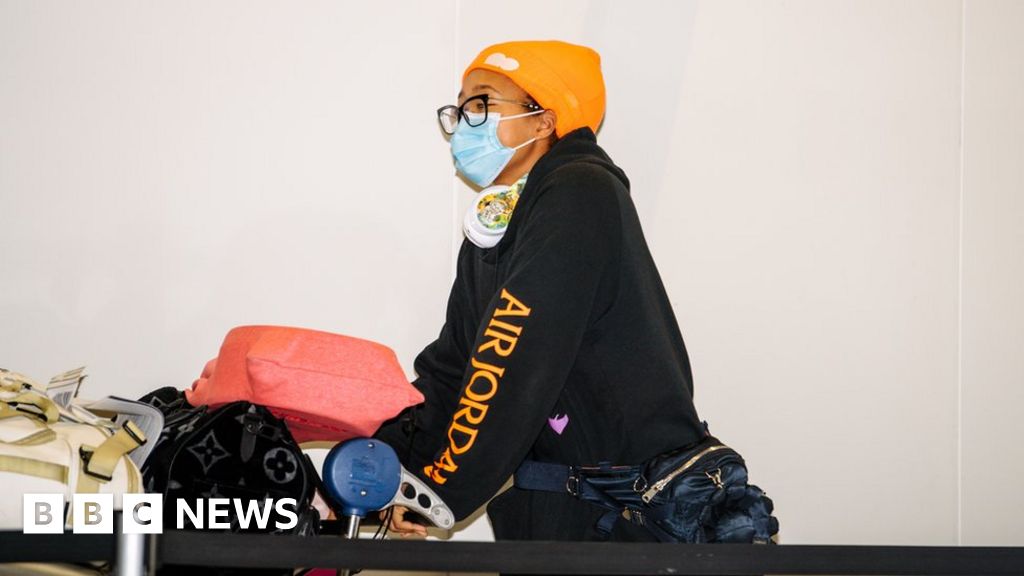
By Sophie Williams
BBC News
The sight of some of the world's biggest tennis stars touching down for the upcoming Australian Open tournament has frustrated many Australians unable to return home due to the pandemic.
Australia currently has a cap on the number of international arrivals, with people having to undergo quarantine in a designated facility.
There are roughly 37,000 Australians waiting to return, ABC news reports.
A number of airlines have suspended routes making it harder to travel back.
On Friday, Emirates airline announced it would be stopping its flights to Melbourne, Sydney and Brisbane.
Organisers of the Australian Open put on chartered flights for the players and other members of staff.
Players had to test negative before boarding flights and were then placed in designated Australian Open quarantine hotels in Melbourne and Adelaide.
Former tennis world number one Andy Murray has been unable to fly out to Australia after the Briton tested positive for coronavirus.
However one player, Tennys Sandgren, who tested positive, was cleared to fly by organisers after his medical file was reviewed.
Sandgren posted on social media that he had been ill in November but was "totally healthy now".
Their arrival, while so many Australians are still trying to return home, has drawn criticism.
"I can't comprehend the fact that one week they announce they're halving the caps for citizens and the following week they announce they've found 1,200 spaces for tennis players and support staff," Sarah, a key worker who lives in London but is from Sydney, told the BBC.
She has been trying to return to Sydney since October and her most recent flight was cancelled.
"All I want to do is return home. I've had to watch my sister's wedding on Zoom. My flight was timed so I get out of quarantine in time for her baby shower but it looks like I'll miss this and the birth".
Dr Alyse Brown is currently based in Cambridge in the UK and has flights booked to Sydney next month. She has been trying to raise awareness about the issue.
"While the Australians back home watch the tennis, I'll be reading on support pages the daily horror stories of stranded Australians entering into homelessness," she told the BBC.
"It has always been apparent to us that Australia has means to get their people home, they just lack the political will to do so and this makes me unspeakably mad. It's heartless economic decision making and the tennis for us is just another group of people we see the government prioritised above us."
People have taken to Twitter using the hashtag #strandedaussies to share their views.
One user said: "Thousands of Australian citizens are still stranded overseas. I've been a huge tennis fan for close to 40 years, but this is just wrong. I will not be supporting this Australian summer of tennis."
Earlier this week, Victorian Premier Daniel Andrews said that if Melbourne cancelled the tournament, it would be picked up by another country.
What are the rules in Australia?
Australia has strict limits on the number of arrivals allowed to enter the country. Authorities say this is to ensure there is enough room in a government quarantine facility.
Unlike other countries, those arriving in Australia must quarantine in a designated facility or hotel instead of their own homes.
The cap on people entering was cut further last week after a hotel worker in Queensland contracted the UK variant of the coronavirus.
Until 15 February, New South Wales will have a weekly cap of 1,505 arrivals, Western Australia will permit 512 people and Queensland will have a cap of 500.
Victoria and South Australia have kept their caps the same. Prime Minister Scott Morrison said the Australian Capital Territory and Northern Territories had their own "bespoke arrangements" for those arriving.
The Australian government has operated a number of repatriation flights but demand has been high.
Last month, in an interview on Australian network Seven, Mr Morrison said Australians overseas were his "first priority in terms of people coming back into the country".
"We want you to come home and you have every right to come home," he said.















 Phone: (800) 737. 6040
Phone: (800) 737. 6040 Fax: (800) 825 5558
Fax: (800) 825 5558 Website:
Website:  Email:
Email: 






